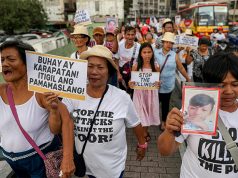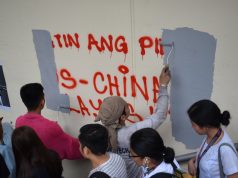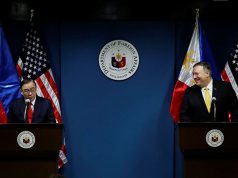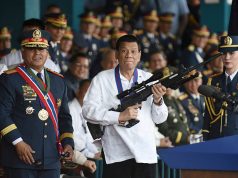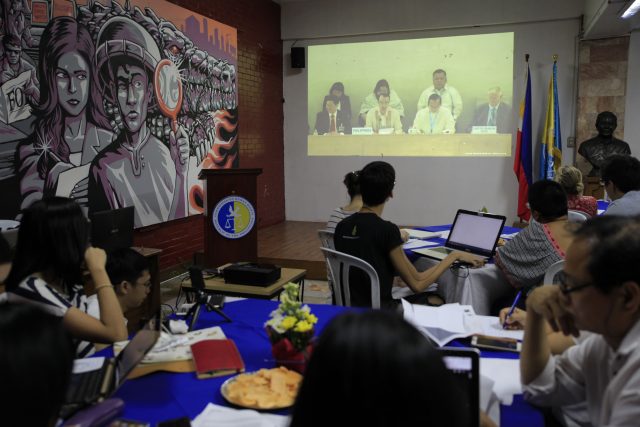
MANILA – Several countries from Europe, Asia, Africa and Latin America on Monday urged the Philippine government to grant access to the UN Special Rapporteur on Extrajudicial Killings, with some specifying that it attach “no conditions” to this, as the country’s record was subjected to periodic review before the UN Human Rights Council in Geneva.
None of the ASEAN member countries that had thus far spoken at Monday’s session of the Universal Periodic Review (UPR) had mentioned the EJKs, noted Human Rights Watch-Philippines’ Carlos Conde. The Philippines is this year’s chair of ASEAN.
Notably, China expressed support for the Duterte administration’s campaign against drugs and urged respect for Philippine sovereignty. Duterte had been cozy with the Chinese leadership, praising as well Chinese donors who built mega rehabilitation centers for Filipino drug users, despite observation by critics that many of those arrested for setting up shabu operations in the country come from China.
HRW-Philippines live-tweeted the proceedings in Geneva, where Sen. Alan Peter Cayetano presented the Philippine position at the head of a 16-man delegation, before Manila was subjected to questions by UN country peers.
Besides granting access to the UN Rapporteur on EJKs, the country-peers also asked Manila to reverse moves to revive the death penalty in the Philippines, while a few called on Manila to guarantee reproductive rights and protect migrant workers.
Among the countries whose representatives urged the Duterte administration to grant access to the UN Rapporteur – to pave the way for an investigation into allegations that the war on drugs had encouraged impunity and caused the deaths to spike – are: Hungary, Lithuania, Bulgaria, Ghana, Latvia, Peru, France and Germany.
At least eight UN representatives from different countries particularly called for the non-imposition of conditions in the grant of access to UN Special Rapporteur Agnes Callamard, who attended a policy forum on Manila last May 5-6 on the drugs war in an “unofficial” capacity. These are Ireland, Hungary, France, Lithuania, Montenegro, Latvia, Germany, and Ghana.
Other countries like Egypt and Estonia used tactful language, urging Manila to align its drug war with “international conditions.”
While not all specifically called for the grant of access to the UN Rapporteur, several member countries expressed grave concern about thousands of EJKs in the “war on drugs” at the country’s Universal Periodic Review on May 8, 2017. Under the UPR, the human rights situation in each UN member country is reviewed every four years, at the Human Rights Council in Geneva.
Countries from every UN region expressed concern over the deaths in connection with the drug war, with many calling for probes into the killings, and accountability for perpetrators, Human Rights Watch noted at the end of the 3-hour UPR session.
“The Philippines is facing a growing chorus of international concern at the human cost of President Duterte’s murderous ‘war on drugs,’” said John Fisher, Geneva director at Human Rights Watch in a statement. “The government’s denial and deflection of criticism shows it has no intention of complying with its international obligations. The Human Rights Council should establish an international inquiry and, if killings without accountability continue, reconsider the Philippines’ council membership.”
Per HRW’s list, the countries expressing concern include Australia, Austria, Botswana, Brazil, Bulgaria, Canada, Chile, Costa Rica, Croatia, Czech Republic, Denmark, Estonia, France, Germany, Ghana, Guatemala, Hungary, Iceland, Ireland, Italy, Japan, Latvia, Lithuania, Luxembourg, Montenegro, Netherlands, New Zealand, Slovakia, Slovenia, Spain, Sweden, Switzerland, Timor-Leste, and the United States.
The Duterte administration has disputed the widely-cited count of least 7,000 people killed in connection with the “drug war” since President Rodrigo Duterte took office on June 30, 2016.
Cayetano defends govt record, slams Callamard
In his presentation, Cayetano drew the Council’s attention to the “change” in the definition of EJKs by certain groups, from its use in previous administrations and in the present one. As a result, he said, certain international groups, NGOs and media had caused the number of supposed “EJKs” to spike, which Cayetano said unfairly casts the Duterte government in a bad light.
Addressing the United Nations Human Rights Council in Geneva on Monday, Cayetano also criticized UN Special Rapporteur Agnes Callamard for quoting a doctor who said in a tweet that methamphetamine hydrochloride (shabu) use does not lead to violence.
“Your excellencies, if you are Filipino, and you read these slides, would you think that the rapporteur is impartial, is factual, is fair?,” he said.
“She may have good intentions. But she got a wave in the Philippines now of parents, brothers, sisters, or OFWs who have drug dependents in the family who have been violent against them. And now they’re saying: why is this person who is an official of the UN telling us that there’s no evidence that it is associated with violence?” he added.
Callamard last week, in an unofficial visit, flew to the Philippines to attend the two-day forum on drug policies organized by the Free Legal Assistance Group (FLAG).
One of the speakers, Dr. Carl Hart, an expert on the effects of illegal drugs from the Columbia University, mentioned that there was no data which suggested that a drug user’s brain shrinks over time, debunking President Rodrigo Duterte’s previous remarks on the matter.
Callamard, who was attending the forum, tweeted about it.
Cayetano’s statements against Callamard came after the former mentioned that the Universal Periodic Review (UPR) of the UN Human Rights Council had not become politicized.
“Again, the UPR of the UN Human Rights Council is a unique and effective process and mechanism. One of the reason it is very effective is the sucess of the United Nations Human Rights in insulating the UPR process from being politicized,” he said.
“However, the UPR is not the only mechanism of the UN that deals with human rights. The system of sending special rapporteurs have oftentimes been effective but sometimes this can create more harm than good, especially when human rights is politicized,” he added.
Cayetano stressed that special rapporteurs should be factual, fair, and just.
“There is a generally accepted principle in law that those who come to court must come with clean hands.Therefore, it is essential that rapporteurs are not only factual, fair and just but they must also appear to be factual, fair and just,” he said.
The senator also said the Philippine government is willing to extend invitations to special rapporteurs as long as they are open and independent.
“The government of the Philippines fully supports special procedures, process of the Human Rights Council. And we’ll extend invitations to special rapporteurs at the most appropriate time provided they prove their openness, independence, and willingness to engage the Philippine government in a constructive dialogue,” he said.
Cayetano, along with the 16-man delegation team of the Philippines, is currently in Geneva, Switzerland to present the country’s human rights records to the United Nations Human Rights Council.
SCROLL DOWN BELOW FOR FULL TEXT OF THE OPENING STATEMENT ON BEHALF OF THE PHIL. GOVERNMENT BY SEN. ALAN PETER CAYETANO
[pdf-embedder url=”http://media.interaksyon.com/wp-content/uploads/2017/05/UPR-May-8-Opening-Statement-AS-DELIVERED.pdf” title=”UPR May 8 Opening Statement AS DELIVERED”]





